2019秋七年级英语上册 module 4 healthy food模块语法讲练习题课件外研版
七年级英语上册module4healthyfood语法篇试题

Module 4语法篇____________________________________________________________________________________________________________________________________________________________________1. 熟练掌握have/has got的用法2. 熟练掌握some, any的用法3. 熟练掌握名词及名词的复数形式一、have/has got 的用法1. have got意为“有;拥有”,如果想表达某人拥有某物,可用句型“主语+have/has got+其他”,其中have有人称和数的变化,当句子主语为第三人称单数或单数名词时,用has got。
当句子主语是其他人称时,用have got。
2. have got的否定形式为:haven’t got或hasn't got。
We haven’t got any juice.我们没有果汁。
3. have got的一般疑问句形式,将have/has提到主语前即可。
---Have you got any carrot? 你有胡萝卜吗?---Yes, I have./No, I haven’t.是的,我有。
/不,我没有。
4. have/has got与there be句型的区别(1)there be句型表示“存在,某地/某时有某人/某物”。
There is a book on the desk. 桌子上有本书。
(2)have got表示“某人拥有某物”,此时是一种所有关系。
She has got a dog. 她有一只狗。
二、some,any的用法some和any 可用作形容词,意为“一些”,在句中修饰名词。
1. some和any既可以修饰可数名词又可以修饰不可数名词,但some常用在肯定句中,而any则常用在否定和疑问句中。
2019秋上册7英外研版Module 4 Healthy foodM4 Unit 1课件
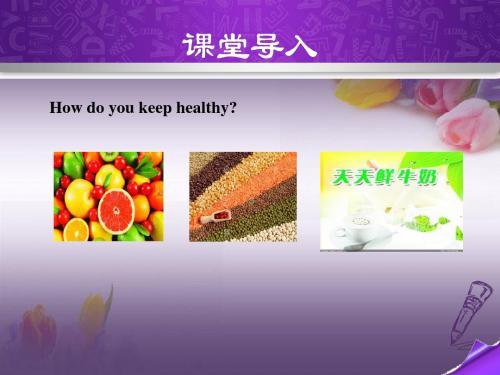
典例 Bananas,apples and oranges are all ___A_____.
(湖南株洲)
A.fruits
B.vegetables C.drinks
典例 —Would you please pass(递给) me something to drink? —What about some ____C____?(浙江嘉兴) A.beef B.fish C.juice D.bread
【点拨】根据上句句意“请递点喝的东西给我,好吗?”可知, 要选能够喝的,四个选项中只有juice是能够喝的。故选C。
魔法 记忆
-o结尾的名词变复数:
目前所学单词只有hero,Negro,tomato和potato
四个单词加-es构成复数。可记忆为:
串联法:黑人英雄爱吃西红柿和马铃薯。
总结法:两人(hero,Negro),两菜(tomato,potato)。
典例 How many___C_____ are there in the basket? (黑龙江齐齐哈尔) A.potato B.bread C.tomatoes
典例 水、茶和牛奶是健康饮料。 __W__a_t_e_r_,__te_a__a_n_d_m__i_lk__a_r_e_h_e_a_l_th_y__d_r_in_k__s.__
【点拨】水、茶和牛奶表示多种饮料, food in the pictures with the words from the box.
Betty’s mum: And we’ve got some tea, tomatoes... and coffee. Betty: But we haven’t got any cola... beans... beef, carrots, juice and milk.
外研版七年级英语上册Module4 Healthy food 知识点
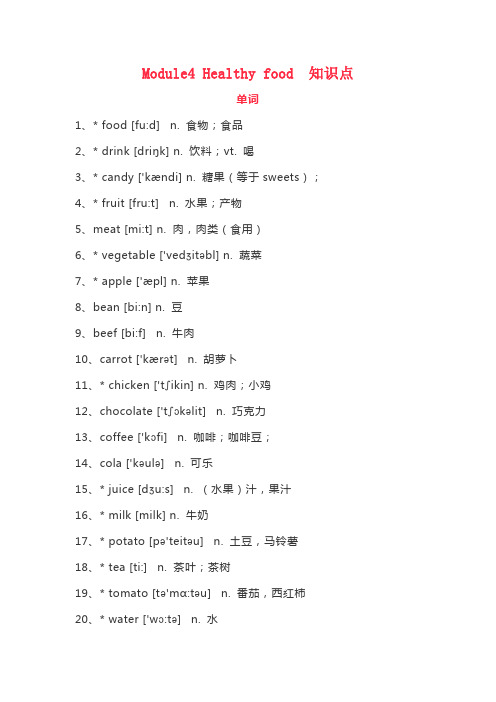
Module4 Healthy food 知识点单词1、* food [fu:d] n. 食物;食品2、* drink [driŋk] n. 饮料;vt. 喝3、* candy ['kændi] n. 糖果(等于sweets);4、* fruit [fru:t] n. 水果;产物5、meat [mi:t] n. 肉,肉类(食用)6、* vegetable ['vedʒitəbl] n. 蔬菜7、* apple ['æpl] n. 苹果8、bean [bi:n] n. 豆9、beef [bi:f] n. 牛肉10、carrot ['kærət] n. 胡萝卜11、* chicken ['tʃikin] n. 鸡肉;小鸡12、chocolate ['tʃɔkəlit] n. 巧克力13、coffee ['kɔfi] n. 咖啡;咖啡豆;14、cola ['kəulə] n. 可乐15、* juice [dʒu:s] n. (水果)汁,果汁16、* milk [milk] n. 牛奶17、* potato [pə'teitəu] n. 土豆,马铃薯18、* tea [ti:] n. 茶叶;茶树19、* tomato [tə'mɑ:təu] n. 番茄,西红柿20、* water ['wɔ:tə] n. 水21、* shop [ʃɔp] vi. 购物;买东西22、go shoping 去买东西,去购物23、* have [hæv, həv] aux. 助动词。
vt. 有,吃,喝24、* get [ɡet] vt. 得到;获得25、have got 有;拥有26、* some [sʌm] adj. 一些;若干;少量。
pron. 一些;某些27、* much [mʌtʃ] adj. 大量的,许多。
外研版七年级上册Module 4 复习文档 (1)
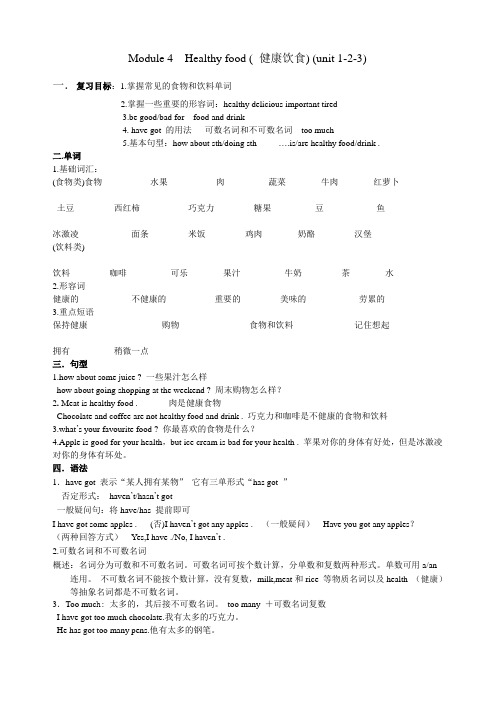
Module 4 Healthy food ( 健康饮食) (unit 1-2-3)一.复习目标:1.掌握常见的食物和饮料单词2.掌握一些重要的形容词:healthy delicious important tired3.be good/bad for food and drink4. have got 的用法可数名词和不可数名词too much5.基本句型:how about sth/doing sth ….is/are healthy food/drink .二.单词1.基础词汇:(食物类)食物_________ 水果_________ 肉________ 蔬菜_______ 牛肉________红萝卜________ 土豆_______ 西红柿________ 巧克力_______ 糖果_________ 豆____________鱼_________冰激凌___________ 面条________ 米饭________ 鸡肉_______ 奶酪________ 汉堡__________(饮料类)饮料______ 咖啡________ 可乐________果汁_________ 牛奶_______ 茶_______ 水_________ 2.形容词健康的___________ 不健康的__________ 重要的________ 美味的___________ 劳累的__________ 3.重点短语保持健康______________ 购物_______________ 食物和饮料______________记住想起_________拥有________ 稍微一点__________三.句型1.how about some juice ? 一些果汁怎么样how about going shopping at the weekend ? 周末购物怎么样?2. Meat is healthy food . 肉是健康食物Chocolate and coffee are not healthy food and drink . 巧克力和咖啡是不健康的食物和饮料3.what’s your favourite food ? 你最喜欢的食物是什么?4.Apple is good for your health,but ice cream is bad for your health . 苹果对你的身体有好处,但是冰激凌对你的身体有坏处。
七年级英语上册Module-4-Healthy-food
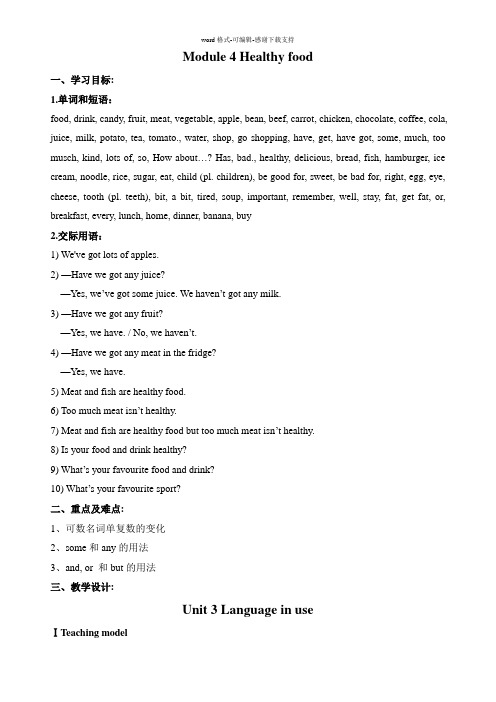
Module 4 Healthy food一、学习目标:1.单词和短语:food, drink, candy, fruit, meat, vegetable, apple, bean, beef, carrot, chicken, chocolate, coffee, cola, juice, milk, potato, tea, tomato., water, shop, go shopping, have, get, have got, some, much, too musch, kind, lots of, so, How about…? Has, bad., healthy, delicious, bread, fish, hamburger, ice cream, noodle, rice, sugar, eat, child (pl. children), be good for, sweet, be bad for, right, egg, eye, cheese, tooth (pl. teeth), bit, a bit, tired, soup, important, remember, well, stay, fat, get fat, or, breakfast, every, lunch, home, dinner, banana, buy2.交际用语:1) We've got lots of apples.2) —Have we got any juice?—Yes, we’ve got some juice. We haven’t got any milk.3) —Have we got any fruit?—Yes, we have. / No, we haven’t.4) —Have we got any meat in the fridge?—Yes, we have.5) Meat and fish are healthy food.6) Too much meat isn’t healthy.7) Meat and fish are healthy food but too much meat isn’t healthy.8) Is your food and drink healthy?9) What’s your favourite food and drink?10) What’s your favourite sport?二、重点及难点:1、可数名词单复数的变化2、some和any的用法3、and, or 和but的用法三、教学设计:Unit 3 Language in useⅠTeaching modelRevision and applicationⅡTeaching methodFormal and interactive practiceⅢTeaching aimsTo summarise and consolidate the usage of some and any . singular and plural nouns . ⅣTeaching ObjectivesKey structures : …have /has got some……haven’t /hasn’t got any…Have / Has … got any…?ⅤTeaching aidsTape recorder , OHP , handoutsⅥTeaching StepsStep 1 RevisionReview the text of Unit 1 and Unit 2 .Step 2 Language practice1. Read through the example sentences in the box with the whole class .2. Ask the students to repeat the sentences in the box.3. Grammar : …have /has got some……haven’t /hasn’t got any…Have / Has … got any…?Step 3 Work in pairs1.Ask the students to work in pairs and to talk about the fridge.— Have we got any meat in the fridge?— Yes , we have.—Have we got any…?—Yes, we have. / No, we haven’t.2.Write about the fridge in the picture with have got some and haven’t got any.We’ve got some mea t.We haven’t got any fish.1. We _______________ vegetables.2. We ________________ orange3. We ________________ apples4. We _______________ eggs.5. We _______________ bananas.6. We ________________ orange juice.7. We _______________ milk.3. Call back the answers from the whole class, check the answers.Answers :1. have got some2. haven’t got any3. haven’t got any4. have got some5. have got some6. have got some7. haven’t got anyStep 4 Look at the picture in Activity 2 and talk about it.1. Ask the students to read the words in the box.2. Look at the picture carefully.3. Talk about like this:He has got some a(n)…He hasn’t got any…She has got some a(n)…She hasn’t got any…The have got some a(n)…They haven’t got any…Step 5 Complete the word map.1. Ask the students to complete the word map individually, then check with a partner.2. Call back the answers from the whole class, check the answers.Step 6 Complete the sentences with the words from the box.1. Ask the students to read through the sentences.2. Complete the sentences with the words from the box.3. Ask the students to check with a partner.4. Call back the answers from the whole class.Keys:1. Remember 2. important 3. stay 4. delicious 5. bitStep 7 Grammar.名词的复数A) 构成方法及读音规则1) 一般情况加–s:map-maps boy-boys girl-girls pen-pens bag-bags car-cars清辅音后读/s/ 浊辅音和元音后读/z/2) 以s, sh, ch, x等结尾加–es, 读/iz/bus-buses watch-watches box-boxes brush-brushes3) 以辅音字母+y结尾,变y 为i再加es, 读/z/baby---babies city-cities country-countries但以y结尾的专有名词,或元音字母+y 结尾的名词变复数时,直接加s变复数。
外研版英语七年级上册Module4 Healthy food知识点总结

重难点知识讲解1.We’ve got lots of apples.[译文]我们有很多苹果。
这里We’ve是We have的缩写形式。
(1)have got表示“某人拥有某物”。
have got句式中have有人称和数的变化,即当句子主语为第三人称单数时,用has got形式。
e.g.We have got some milk.我们有些牛奶。
He has got an orange.他有一个橘子。
Tony has got some bread.托尼有些面包。
(2)如果表示“某人没有某物”,则用haven’t got或hasn’t got形式,即在have/has后加not构成否定形式。
e.g.We haven’t got any juice.我们没有果汁了。
She hasn’t got any milk.她没有牛奶了。
(3)如果要询问“某人有某物吗?”则把have/has提到主语前即可。
e.g.—Have you got any carrots?你有一些胡萝卜吗?—Yes, I have. /No, I haven’t.是的,我有。
/不,我没有。
—Has he got a new pen?他有一支新钢笔吗?—Yes, he has. /No, he hasn’t.是的,他有。
/不,他没有。
(4)there be句型与have/has got句式的区别there be句型和have/has got句式都表示“有”,但两者表示拥有的对象不同。
① there be句型表示“存在”,指“某地/某时有某人/某物”。
e.g.There is a book on the desk.桌子上有一本书。
There are some boys in the room.房间里有一些男孩。
② have got表示“人拥有”,指“某人(拥)有某物”,是一种所有关系。
e.g.I have got a cat.我有一只猫。
She has got some fruit.她有些水果。
外研社 七年级上册 Module 4 Healthy food 知识点总结
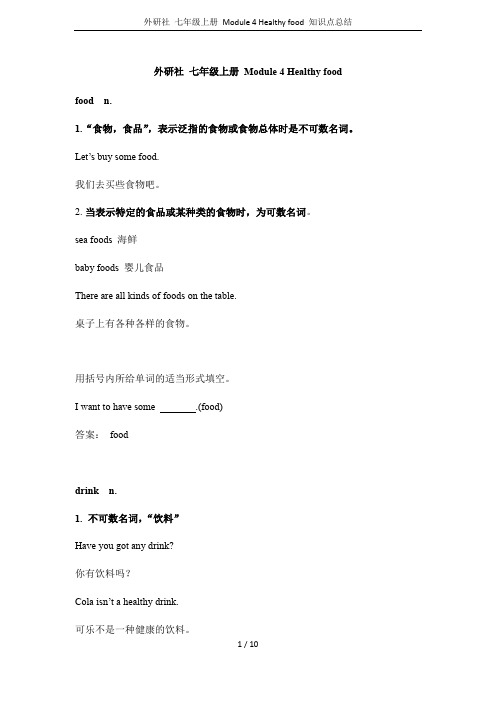
外研社七年级上册Module 4 Healthy food food n.1.“食物,食品”,表示泛指的食物或食物总体时是不可数名词。
Let’s buy some food.我们去买些食物吧。
2.当表示特定的食品或某种类的食物时,为可数名词。
sea foods 海鲜baby foods 婴儿食品There are all kinds of foods on the table.桌子上有各种各样的食物。
用括号内所给单词的适当形式填空。
I want to have some .(food)答案:fooddrink n.1.不可数名词,“饮料”Have you got any drink?你有饮料吗?Cola isn’t a healthy drink.可乐不是一种健康的饮料。
2.动词,“喝,饮”I don’t drink tea.我不喝茶。
用括号内所给动词的适当形式填空。
1.I am thirsty, I need some .(drink)2.Mary often (drink) some milk for breakfast. 答案:1. drink 2. drinksfruit n.1.“水果”,指水果总称时,为不可数名词。
Do you like fruit?你喜欢水果吗?2.指水果的种类或个别水果时,是可数名词。
I like to eat apples, bananas and other fruits.我喜欢吃苹果、香蕉及其他水果。
汉译英。
1.许多水果2.许多种水果答案:1. a lot of fruit 2. a lot of fruitschicken n.1.“鸡肉”,不可数名词Chicken is healthy food. I like eating it.鸡肉是健康食品,我喜欢吃。
2.“小鸡”,可数名词We can see some chickens on the farm.在农场里我们可以看见一些小鸡。
初一英语上册(外研版)Module 4 Healthy food 知识点总结
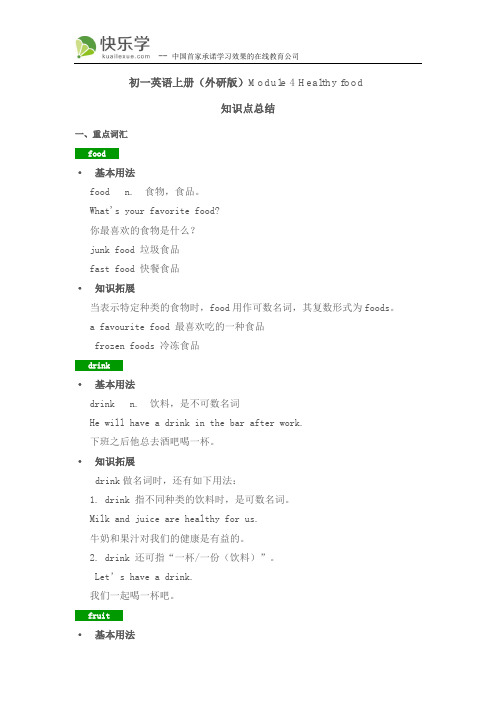
初一英语上册(外研版)Module 4 Healthy food知识点总结一、重点词汇food·基本用法food n. 食物,食品。
What's your favorite food?你最喜欢的食物是什么?junk food 垃圾食品fast food 快餐食品·知识拓展当表示特定种类的食物时,food用作可数名词,其复数形式为foods。
a favourite food 最喜欢吃的一种食品frozen foods 冷冻食品drink·基本用法drink n. 饮料,是不可数名词He will have a drink in the bar after work.下班之后他总去酒吧喝一杯。
·知识拓展drink做名词时,还有如下用法:1. drink 指不同种类的饮料时,是可数名词。
Milk and juice are healthy for us.牛奶和果汁对我们的健康是有益的。
2. drink 还可指“一杯/一份(饮料)”。
Let’s have a drink.我们一起喝一杯吧。
fruit·基本用法fruit n. 水果,当指水果的总称时,是不可数名词;指水果的种类或个别水果时,是可数名词。
What's your favorite fruit?你最喜欢的水果是什么?apple·基本用法apple n. 苹果(复数形式:apples)This apple is very nice.这个苹果很好吃。
注意:apple是以元音音素开头的可数名词,故用不定冠词an表示“一个”。
chicken·基本用法chicken n. 鸡肉;小鸡。
当表示“鸡肉”时,是不可数名词;当表示“小鸡”时,是可数名词,其复数形式为chickens。
We need some meat, chicken and fish. (chicken做“鸡肉”讲)我们需要一些肉,鸡肉和鱼。
最新外研版七年级英语上册 Module4 Healthy food 知识点提炼

Module4 Healthy food重点一、重点单词1. drink n.饮料,不可数名词,还有如下用法:(1)drink 指不同种类的饮料时,是可数名词。
Milk and juice are healthy for us. 牛奶和果汁对我们的健康是有益的。
(2)drink 还可指“一杯/一份(饮料)”。
Let’s have a drink.我们一起喝一杯吧。
2. much adj.许多的,大量的,其后接不可数名词,其反义词为little。
too much 意为“太多”,常用来修饰不可数名词too many 意为“太多”,常用来修饰可数名词3. kind n.品种,种类,可数名词。
拓展---相关短语(1)a kind of 一种An apple is a kind of fruit. 苹果是一种水果。
(2)all kinds of 各种各样的I love all kinds of sports. 我喜欢各种各样的运动。
4. or conj. 或者;还是,or连接并列主语时,谓语动词要与最后的那个主语保持一致。
Which do you prefer, lamb chops or pork chops? 你比较喜欢小羊排,还是猪排?辨析:and/or,and意为“并且”,or意为“或者,否则”,做“和,并且”讲时常用于否定句中。
I don't like apples or bananas. 我不喜欢苹果和香蕉。
5. remember v. 记住;想起相关句型:(1)remember to do sth. 记着去做某事Remember to write us when you get there. 到了那儿别忘了给我们写信。
(2)remember doing sth. 记得做过某事I remember meeting you somewhere. 我记得在哪儿见过你。
6. healthy adj. 健康的拓展:反义词:unhealthy adj. 不健康的He has an unhealthy diet and does no exercise. 他饮食不健康,也不做运动。
外研版七年级英语M4 Healthy food 重点
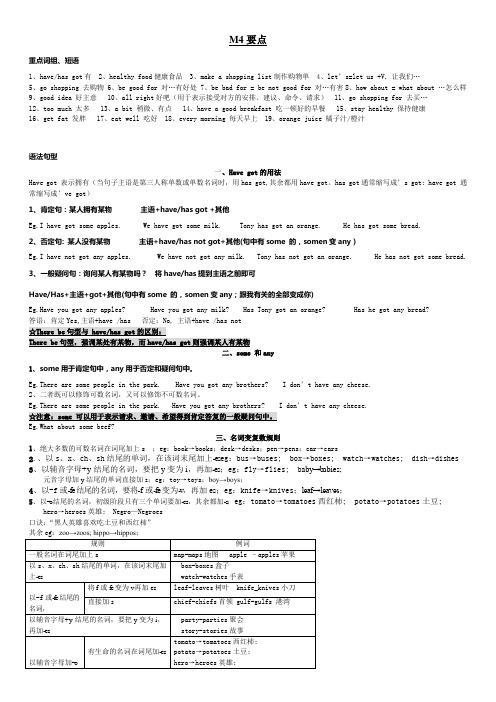
M4要点重点词组、短语1、have/has got有2、healthy food健康食品3、make a shopping list制作购物单4、let’s=let us +V. 让我们…5、go shopping 去购物6、be good for 对…有好处7、be bad for = be not good for 对…有害8、how about = what about …怎么样9、good idea 好主意 10、all right好吧(用于表示接受对方的安排、建议、命令、请求) 11、go shopping for 去买…12、too much 太多 13、a bit 稍微、有点 14、have a good breakfast 吃一顿好的早餐 15、stay healthy 保持健康16、get fat 发胖 17、eat well 吃好 18、every morning 每天早上 19、orange juice 橘子汁/橙汁语法句型一、Have got的用法Have got 表示拥有(当句子主语是第三人称单数或单数名词时,用has got,其余都用have got。
has got通常缩写成’s got; have got 通常缩写成’ve got)1、肯定句:某人拥有某物主语+have/has got +其他Eg.I have got some apples. We have got some milk. Tony has got an orange. He has got some bread.2、否定句: 某人没有某物主语+have/has not got+其他(句中有some 的,somen变any )Eg.I have not got any apples. We have not got any milk. Tony has not got an orange. He has not got some bread.3、一般疑问句:询问某人有某物吗?将have/has提到主语之前即可Have/Has+主语+got+其他(句中有some 的,somen变any;跟我有关的全部变成你)Eg.Have you got any apples? Have you got any milk? Has Tony got an orange? Has he got any bread?答语:肯定Yes,主语+have /has 否定:No, 主语+have /has not二、some 和any1、some用于肯定句中,any用于否定和疑问句中。
七年级英语上册 Module 4 Healthy food整体分析 (新版)外研版

Module 4Healthy food Unit 1We've got lots of apples.单词卡片名词: food, drink, candy, fruit, meat, vegetable, apple, bean, beef, carrot, chicken, chocolate, coffee, cola, juice, milk, potato, tea,tomato, water, kind动词: drink, shop, have, has, get形容词: some, much, bad代词: some连词: so短语归纳have/has got, go shopping, too much, lots of=a lot of, be bad for, begood for, what kind of…句型再现1.Tony, let's go shopping for food and drink.2.Too much chocolate isn't good for you.3.We haven't got any oranges.4.How about some orange juice?5.—Have we got any…?—Yes, we have. We've got some…/No, we haven't.Unit 2Is your food and drink healthy? & Unit 3单词卡片名词: bread, fish, hamburger, ice cream, noodle, rice, sugar, child/children, egg, eye, cheese,tooth/teeth, bit, soup, breakfast,lunch, home, dinner, banana动词: eat, remember, stay, buy形容词: healthy, delicious, sweet, right, tired, important, fat, every连词: or副词: well短语归纳a bit, healthy food and drink, chicken soup, at home, orange juice, stay healthy, get fat, have breakfast, in the West, favourite food, favouritedrink句型再现1.Is your food and drink healthy?2.Meat is healthy but too much meat is not good for children.3.Eat the right food and be healthy.4.Have lots of delicious chicken soup!5.It is important to remember: eat well, stay healthy, and don't getfat!教材内容解读本模块以“Healthy food”作为话题,通过本单元的学习不仅能增进学生对健康食品的了解,还可以引导他们培养健康的饮食习惯。
七年级上册Module4Healthyfood外研版七年级英语上册M

外研版新标准英语七年级上Module 4 Healthy foodUnit 1 We've gotlots of apples教学课型:Listening and Speaking教材分析本模块是外研版七年级上册第四模块,以“Healthy fbod”为话题,针对中学生挑食,吃零食的现象,重点介绍了健康食品。
本话题与学生的生活实际紧密相关,因而七年级学生对此很感兴趣,同时也增加了他们对健康食品的了解,有助于培养其健康的饮食习惯。
本节课是第一单元,侧重培养学生的听说能力,对话语境是托尼和爸爸谈论家里有什么食物及还需购买什么食物,自然引出语法项目“have/have got…”句型,要求学生能用“have/have got…”结构谈论购买什么食物,同时引入“健康食物”的概念。
学情分析本单元的主题是谈论水果、蔬菜和饮料方面的购物计划,围绕这一主题进行一系列的交际活动, 本课的学习主体是初一学生,他们好奇心强,乐于表达,有较强的模仿能力和求知欲,并具备了简单的英语口语交际的能力,他们对于蔬菜和水果单词的学习应该不成问题。
但是由于课堂时间有限,学生对have/has got句型的肯定句,否定句和疑问句的运用可能不够熟练,需要更多时间操练,因此本人在教学中设置了小组合作学习,针对不同层次学生的学习,安排可选择的难易活动和题目,以提高综合运用语言能力,使各个层次的学生都有所收获。
教学目标1 .知识与技能目标1)功能谈论健康食品2)词汇理解并掌握本单元中的下列单词(准确发音、拼写、掌握词性、理解词义、并能真实运用)。
名词(214、):food, drink, candy, fruit, meat, vegetable, apple, bean, beef, carrot, chicken, chocolate, coffee, cola, juice, milk, potato, tea, tomato, water, kind形容词(4 个):some, any, much, bad动词(4 个):drink, shop, have, has短语(6 个):go shopping fbr, too much. How about...? lots of, be good/bad fbr, all right3)语法掌握“have/hasgot…”句型的肯定句、否定句、一般疑问句及其回答;能在句子中正确使用“some” 和“any”;能区分可数名词和不可数名词4)语音正确朗读[s] [z] [t] [d]5)能听懂关于食物和饮料的对话;能通过语调识别出句式。
2019年外研版七年级上册英语教案:Module4Healthyfood

1.理论介绍:首先,我们要了解健康饮食的基本概念。健康饮食是指选择营养均衡、对身体健康有益的食物。它对我们的成长发育和身体健康有着重要的影响。
2.案例分析:接下来,我们来看一个具体的案例。这个案例展示了健康饮食在实际中的应用,以及它如何帮助我们改善身体素质。
3.重点难点解析:在讲授过程中,我会特别强调一般现在时的句型和动词第三人称单数形式这两个重点。对于难点部分,我会通过举例和比较来帮助大家理解。
2019年外研版七年级上册英语教案:Module 4 Healthy food
一、教学内容
2019年外研版七年级上册英语教案:Module 4 Healthy food
本节课我们将聚焦Module 4 Healthy food,涵盖以下内容:
1. Unit 1: What's your favourite food?
1.在提问时更加注重引导性和启发性,激发学生的思考和兴趣。
2.针对语法难点,设计更多有趣、实用的练习和例句,帮助学生掌握。
3.增加口语表达练习,提高学生的英语口语能力。
4.提高自己在课堂上的观察力,关注每个学生的学习状态,及时调整教学方法。
1.讨论主题:学生将围绕“健康饮食在日常生活中的应用”这一主题展开讨论。他们将被鼓励提出自己的观点和想法,并与其他小组成员进行交流。
2.引导与启发:在讨论过程中,我将作为一个引导者,帮助学生发现问题、分析问题并解决问题。我会提出一些开放性的问题来启发他们的思考。
3.成果分享:每个小组将选择一名代表来分享他们的讨论成果。这些成果将被记录在黑板上或投影仪上,以便全班都能看到。
在导入环节,通过提问学生们日常生活中的饮食习惯,成功引起了他们对健康饮食的关注。但我也意识到,如果能在提问时加入更多引导性的话语,可能会激发学生更深入的思考。
外研版七年级上册Module 4 Healthy food知识点 及练习
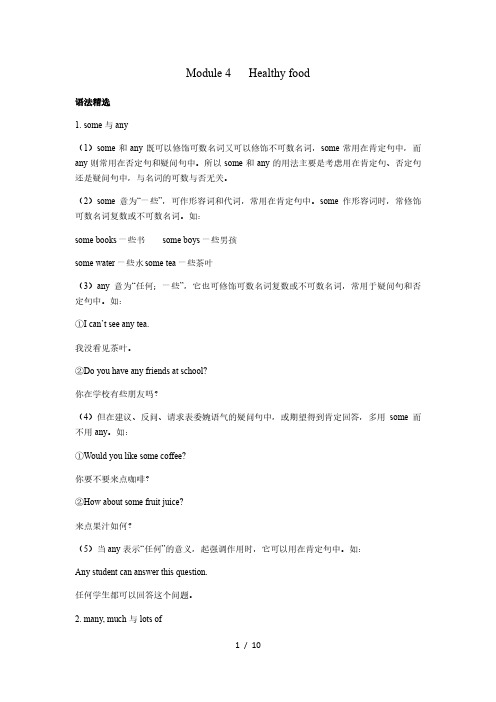
Module 4 Healthy food语法精选1. some与any(1)some和any既可以修饰可数名词又可以修饰不可数名词,some常用在肯定句中,而any则常用在否定句和疑问句中。
所以some和any的用法主要是考虑用在肯定句、否定句还是疑问句中,与名词的可数与否无关。
(2)some意为“一些”,可作形容词和代词,常用在肯定句中。
some作形容词时,常修饰可数名词复数或不可数名词。
如:some books一些书some boys一些男孩some water一些水some tea一些茶叶(3)any意为“任何;一些”,它也可修饰可数名词复数或不可数名词,常用于疑问句和否定句中。
如:①I can’t see any tea.我没看见茶叶。
②Do you have any friends at school?你在学校有些朋友吗?(4)但在建议、反问、请求表委婉语气的疑问句中,或期望得到肯定回答,多用some而不用any。
如:①Would you like some coffee?你要不要来点咖啡?②How about some fruit juice?来点果汁如何?(5)当any表示“任何”的意义,起强调作用时,它可以用在肯定句中。
如:Any student can answer this question.任何学生都可以回答这个问题。
2. many, much与lots of(1)many意为“许多”,用来修饰可数名词复数。
如:①Are there many students in his class?他的班上有很多学生吗?②I haven’t got many English books.我没有很多英语书。
(2)much意为“许多”,用来修饰不可数名词。
如:①We haven’t got much work to do.我们没有太多工作要做。
②Is there much milk in the bottle?瓶子里有很多牛奶吗?(3)lots of=a lot of,意为“许多”,它既可以修饰可数名词,相当于many;也可以修饰不可数名词,相当于much。
七年级英语上册 Module 4 Healthy food(have、has got及some和any的用法)语法精讲精练 (新版)外研版
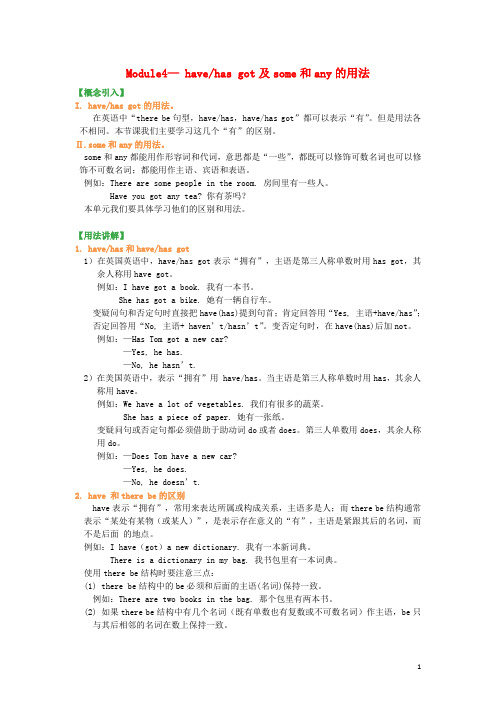
Module4— have/has got及some和any的用法【概念引入】I. have/has got的用法。
在英语中“there be句型,have/has,have/has got”都可以表示“有”。
但是用法各不相同。
本节课我们主要学习这几个“有”的区别。
Ⅱ.some和any的用法。
some和any都能用作形容词和代词,意思都是“一些”,都既可以修饰可数名词也可以修饰不可数名词;都能用作主语、宾语和表语。
例如:There are some people in the room. 房间里有一些人。
Have you got any tea? 你有茶吗?本单元我们要具体学习他们的区别和用法。
【用法讲解】1. have/has和have/has got1)在英国英语中,have/has got表示“拥有”,主语是第三人称单数时用has got,其余人称用have got。
例如:I have got a book. 我有一本书。
She has got a bike. 她有一辆自行车。
变疑问句和否定句时直接把have(has)提到句首;肯定回答用“Yes, 主语+have/has”;否定回答用“No, 主语+ haven’t/hasn’t”。
变否定句时,在have(has)后加not。
例如:—Has Tom got a new car?—Yes, he has.—No, he hasn’t.2)在美国英语中,表示“拥有”用 have/has。
当主语是第三人称单数时用has,其余人称用have。
例如:We have a lot of vegetables. 我们有很多的蔬菜。
She has a piece of paper. 她有一张纸。
变疑问句或否定句都必须借助于助动词do或者does。
第三人单数用does,其余人称用do。
例如:—Does Tom have a new car?—Yes, he does.—No, he doesn’t.2. have 和there be的区别have表示“拥有”,常用来表达所属或构成关系,主语多是人;而there be结构通常表示“某处有某物(或某人)”,是表示存在意义的“有”,主语是紧跟其后的名词,而不是后面的地点。
外研版七年级英语上册Module 4 Healthy food模块知识盘点
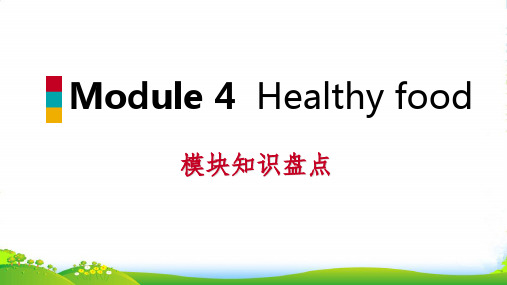
模块知识盘点
7. all right 好的 8. a lot of 许多 9. food and drink 饮食 10. a bit tired 有点儿累 11. remember to do sth. 记得去做某事 12. eat well 吃得好
模块知识盘点
13. stay healthy 保持健康 14. get fat 变胖 15. have a good breakfast 吃一顿丰盛的早餐
以我们去买些吧。
模块知识盘点
6. How about some tea? 买些茶怎么样? 7. Eat the right food and be healthy. 吃合适的食物,保持健康。 8. It is important to remember... 记住……很重要。 9. Have a good breakfast every morning. 每天早上吃一顿丰盛的
模块知识盘点
potatoes are good for eyes. When you are a bit tired, have lots of chicken soup. It’s important to remember: eat well, stay healthy and don’t get fat.
模块知识盘点
经典句型 1. Tony, let’s go shopping for food and drink.托尼,让我们去买些食
物和饮料吧。 2. Now, we haven’t got any meat.现在,我们没有肉了。 3. Have we got any chocolate?我们有巧克力吗? 4. What kind of fruit?什么种类的水果? 5. We haven’t got any oranges, so let’s get some.我们没有橙子了,所
Module4 Healthy food词句精讲精练
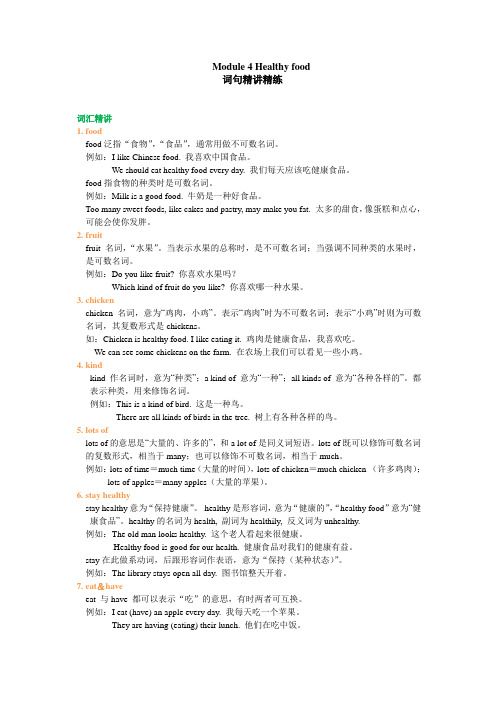
Module 4 Healthy food词句精讲精练词汇精讲1. foodfood泛指“食物”,“食品”,通常用做不可数名词。
例如:I like Chinese food. 我喜欢中国食品。
We should eat healthy food every day. 我们每天应该吃健康食品。
food指食物的种类时是可数名词。
例如:Milk is a good food. 牛奶是一种好食品。
Too many sweet foods, like cakes and pastry, may make you fat. 太多的甜食,像蛋糕和点心,可能会使你发胖。
2. fruitfruit 名词,“水果”。
当表示水果的总称时,是不可数名词;当强调不同种类的水果时,是可数名词。
例如:Do you like fruit? 你喜欢水果吗?Which kind of fruit do you like? 你喜欢哪一种水果。
3. chickenchicken名词,意为“鸡肉,小鸡”。
表示“鸡肉”时为不可数名词;表示“小鸡”时则为可数名词,其复数形式是chickens。
如:Chicken is healthy food. I like eating it. 鸡肉是健康食品,我喜欢吃。
We can see some chickens on the farm. 在农场上我们可以看见一些小鸡。
4. kindkind 作名词时,意为“种类”;a kind of 意为“一种”;all kinds of 意为“各种各样的”。
都表示种类,用来修饰名词。
例如:This is a kind of bird. 这是一种鸟。
There are all kinds of birds in the tree. 树上有各种各样的鸟。
5. lots oflots of的意思是“大量的、许多的”,和a lot of是同义词短语。
lots of既可以修饰可数名词的复数形式,相当于many;也可以修饰不可数名词,相当于much。
